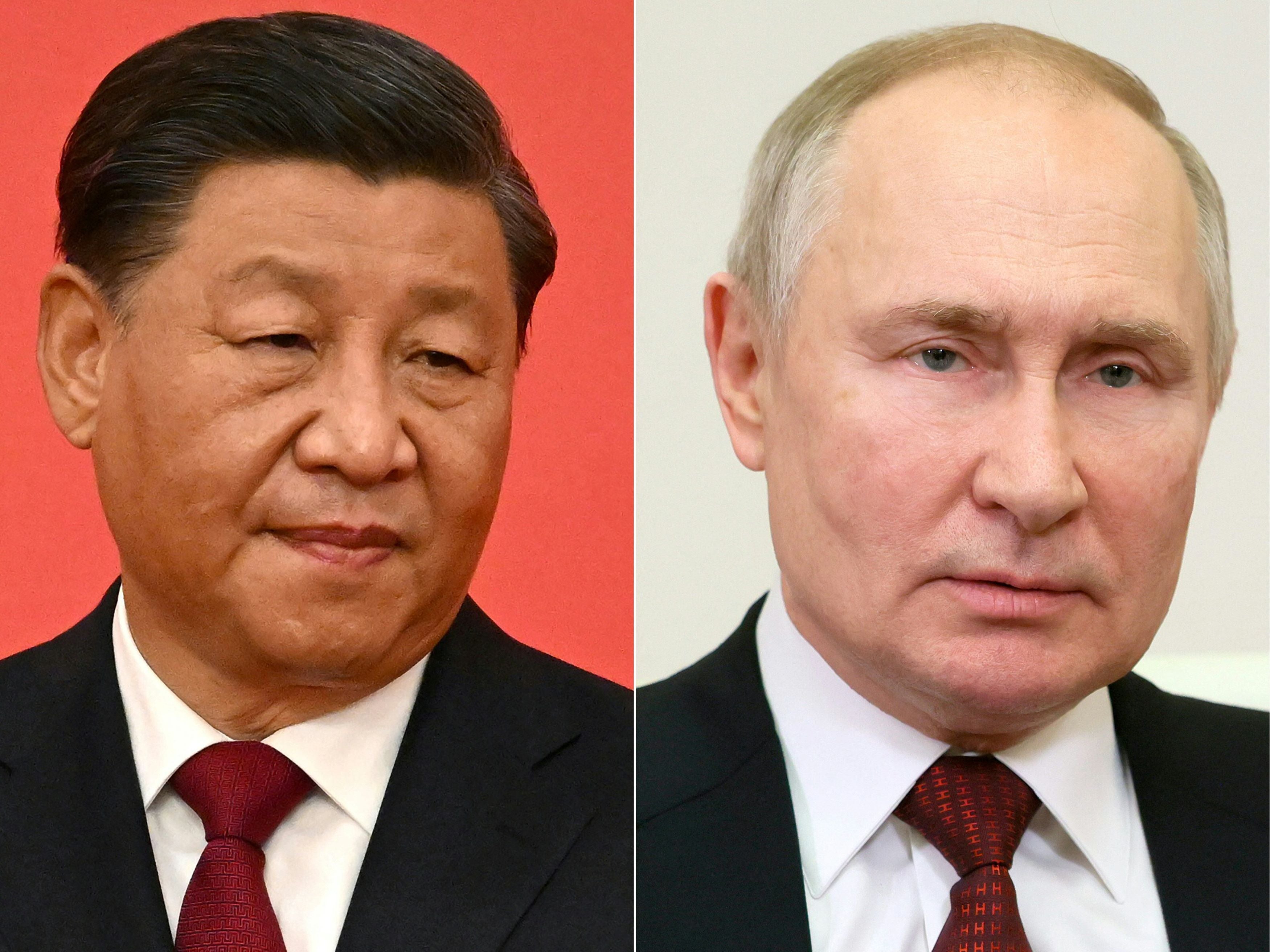In the relationship between China and Russia, it is clear who calls the shots
Editorial: The reality is that China needs the West more than it needs Russia; and Russia needs China more than China needs Russia

The release of British foreign policy archives dating back to the Blair era are a reminder of the high hopes at the time that Russia’s then-young new leader, Vladimir Putin, could bring his nation wholeheartedly into the democratic international community.
In 2001, Tony Blair, like other European leaders (and George W Bush in Washington), expended much diplomatic capital on the Russian. Mr Bush at the time publicly declared that “I looked the man in the eye. I found him very straightforward and trustworthy – I was able to get a sense of his soul.” Mr Blair sent President Putin a set of silver No 10 cufflinks as a birthday present.
But we also know now that Western advisers were urging a more cautious approach, conscious that, even at the moment of optimism, Russia was deploying intelligence agents with a view to damaging Western interests.
We are also now more aware that Mr Putin’s revanchist instincts were strong right from the moment when he had to vacate his desk at the KGB station in East Germany. Even 20 years ago, he viewed the fall of the Soviet Union and its bloc of client states in Eastern Europe as a tragedy of historic proportions, closely allied with a belief that Ukraine was a pretend country.
Far more than the loss of the likes of Estonia, Ukraine’s dash for independence in 1990 spelt the end of the USSR. Had Ukraine maintained its partnership with Russia, the USSR might have survived. It didn’t, and Mr Putin has resented the fact ever since – and sought to reverse it, as we see.
Blair and Bush, then, were, with the benefit of hindsight, deeply naive about the true nature of Vladimir Putin. This is not the case with Mr Putin’s new friend and ally, Xi Jinping, who shared a video conference and talks with him yesterday.
When President Xi declared in February last year, before the Russian invasion of Ukraine, that there were “no limits” to China’s friendship with Russia, he probably did not have in mind the threat of a thermonuclear war with the West that would destroy the planet, taking China and President Xi to oblivion.
Nor, in fact, did Mr Xi envisage what is now a protracted war of attrition in Ukraine, with no end in sight and inflicting vast damage on world trade – and, therefore, China’s export-oriented industries. (Nor, to be fair, did Mr Putin, who no doubt exuded the same confidence to him about swift victory as he did to the rest of the world before his forces were humiliated on the battlefields.)
In this relationship, it is clear who calls the shots. China is Russia’s sole ally of any importance in the world, and Moscow has become even more dependent on Beijing for its economic survival at a time of tight Western sanctions. Despite being gripped by a Covid crisis that is entirely self-inflicted, China’s economy is still far more virile than Russia’s, even before the West disinvested and sanctioned its exports.
Indeed during the course of the conflict, China’s friendship with Russia has been shown to have very definite limits, and some have been publicly admitted. China will not sell Russia any significant military equipment in its hopeless war, for fear of Western sanctions. That is unlikely to change.
Beijing may not care much about the fate of Ukraine, but neither does it wish to provoke the United States needlessly, and the Ukraine conflict has already been unhelpful to China. The dream, for example, of using Ukraine as both precedent and distraction to effect a swift invasion of Taiwan has faded as fast as Russian soldiers have retreated east of Donetsk.
The West’s show of resilience and unity, including from regional powers such as South Korea, Japan and Australia, has taken Russia and China by surprise, and highlighted the parallel dangers of Chinese expansionism in the region and its global reach for power via the Belt and Road initiative (BRI). Germany has reversed its previous quasi-pacifism, and Japan looks set to step up its defence programmes. None of these developments are beneficial to Chinese interests.
Even Chinese economic support, cited as a key area of progress in the read-out from the talks is double-edged for the Kremlin. With the loss of Western energy markets, China is now Russia’s principal export market, and President Xi has in effect got his patent leather shoe poised over the windpipe of the Russian economy.
In due course, Russia could easily become extremely reliant on Chinese investment and technology – in essence, just another neo-colonial possession of the BRI.
Even in the days of Mao, and a supposed shared Marxist-Leninist ideology, China and Russia jostled for leadership of the world communist revolution – and their rivalry could occasionally turn violent along the border. Their mutual alienation from America has tended to push them closer, but obvious differences remain, and the relationship is lopsided.
The reality is that China needs the West more than it needs Russia; and Russia needs China more than China needs Russia.
By the time the pair next meet, when President Xi makes a state visit to Moscow, China would likely prefer to see an end to the war in Ukraine – and a consequent stabilisation of the world economy.
The end of the war in Ukraine in a stalemate might also mean the ousting of Vladimir Putin, and a new host for the ceremonials in the Russian capital. If that was in the Chinese interest, President Xi would accept it with equanimity. Even the best friendships have their limits.






Join our commenting forum
Join thought-provoking conversations, follow other Independent readers and see their replies
Comments